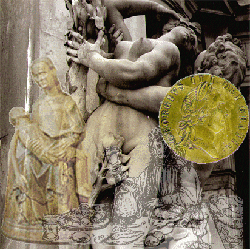| |
What
can the hopes and fears of a given society tell us about it
and ourselves? For example, did the gravest "sins" in pre-modern
and early modern Europe involve food, money, or sex? Among
the hallmarks of the nascent modern age were new social formations
(classes) and the commercialization of daily activities and
relations. What role did traditional institutions and belief
systems play in these processes? For example, did they hamper
or facilitate the changes—or is the relation too complex
to be characterized in this manner? Did the increase in the
sheer number of "things" change the way people thought? What
changes did the family and private life undergo? Can we distinguish
between national and religious contexts? How did the written
or printed word affect these processes? For that matter, how
did the word—even knowledge itself—become commodified?
Our examination begins with a period in which Catholicism
was virtually unchallenged, continues through the Protestant
Reformation, and concludes at the point where a distinctly
secular world view emerges as at least a theoretical alternative.
Our readings deal in particular with Italy, England, the Netherlands,
and Germany. At the heart of the course is the concept of
culture as a process through which individuals and groups
struggle to shape and make sense of their social institutions
and daily lives. By considering in detail representative works
of recent scholarship, we will examine the interaction between
gender, sexuality, property relations, religion, and the growing
power of the state in both urban and rural settings.
A core course for concentrators in history, the social sciences,
and cultural studies. Writing assignments take the form of
historiographic essays based on class readings. Some background
in European history strongly recommended, but all interested
students are welcome.
course
requirements
The
main requirement is that students be prepared to assume the
responsibilities dictated by a seminar format. This means
studying the readings with care and being able to discuss
them at a sophisticated level. Note: It does not mean that
you have to understand everything or have all the answers
right off the bat—rather, only that you be able to articulate
a well-reasoned response, even if it is one of confusion.
We will learn from one another through dialogue.
Class
discussion should provide you with an opportunity to test
your interpretations, to raise questions about issues that
may seem unclear to you, &c.—in short, to enter into
a free and, it is to be hoped, lively debate with the instructor
and your fellow students. This is your chance to take a hand
in the shaping of the class.
Readings:
The
amount of reading is significant. Most of the readings are
not conceptually demanding, but all require close attention.
Although the length of the assignments varies from session
to session, you should be prepared to read some 150-200 pages
per week. Budget your time accordingly.
Go
over the texts carefully, and be prepared to comment on them
in detail. To that end, take appropriate notes and jot down
questions, both of which should serve as a basis for your
participation in discussion. Think about why the readings
may have been assigned. Consider the theses and perspectives
of the authors. In the case of secondary works, consider in
particular the use of evidence. Always try to relate a given
assignment to the preceding readings—to the broader concerns
of the course. You should read for the "big" ideas and patterns,
but you will be unable to evaluate the authors' arguments
if you haven't mastered the specifics.
Writing assignments will take the form of frequent
short response papers, and several essays. Further details
will be provided in class.
go
to the course website[link to follow]
|
|
